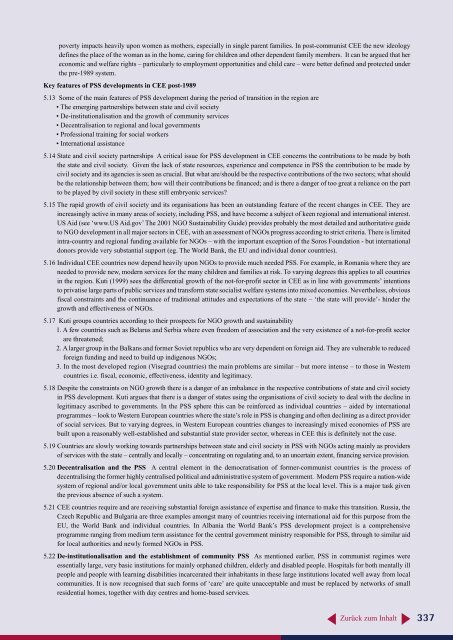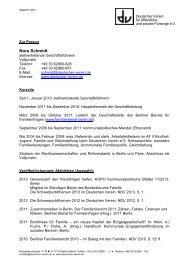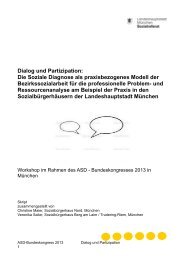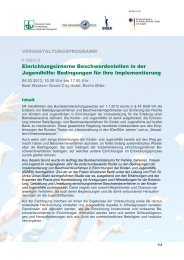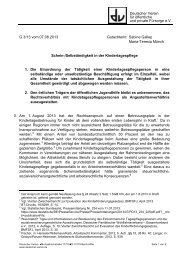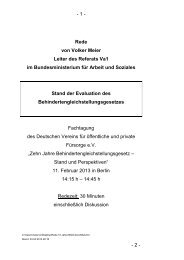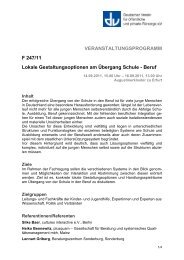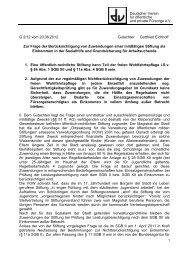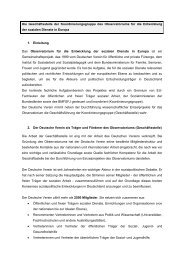Workshop 1.6 - Deutscher Verein für öffentliche und private Fürsorge
Workshop 1.6 - Deutscher Verein für öffentliche und private Fürsorge
Workshop 1.6 - Deutscher Verein für öffentliche und private Fürsorge
Sie wollen auch ein ePaper? Erhöhen Sie die Reichweite Ihrer Titel.
YUMPU macht aus Druck-PDFs automatisch weboptimierte ePaper, die Google liebt.
poverty impacts heavily upon women as mothers, especially in single parent families. In post-communist CEE the new ideology<br />
defines the place of the woman as in the home, caring for children and other dependent family members. It can be argued that her<br />
economic and welfare rights – particularly to employment opportunities and child care – were better defined and protected <strong>und</strong>er<br />
the pre-1989 system.<br />
Key features of PSS developments in CEE post-1989<br />
5.13 Some of the main features of PSS development during the period of transition in the region are<br />
• The emerging partnerships between state and civil society<br />
• De-institutionalisation and the growth of community services<br />
• Decentralisation to regional and local governments<br />
• Professional training for social workers<br />
• International assistance<br />
5.14 State and civil society partnerships A critical issue for PSS development in CEE concerns the contributions to be made by both<br />
the state and civil society. Given the lack of state resources, experience and competence in PSS the contribution to be made by<br />
civil society and its agencies is seen as crucial. But what are/should be the respective contributions of the two sectors; what should<br />
be the relationship between them; how will their contributions be financed; and is there a danger of too great a reliance on the part<br />
to be played by civil society in these still embryonic services?<br />
5.15 The rapid growth of civil society and its organisations has been an outstanding feature of the recent changes in CEE. They are<br />
increasingly active in many areas of society, including PSS, and have become a subject of keen regional and international interest.<br />
US Aid (see ‘www.US Aid.gov’ The 2001 NGO Sustainability Guide) provides probably the most detailed and authoritative guide<br />
to NGO development in all major sectors in CEE, with an assessment of NGOs progress according to strict criteria. There is limited<br />
intra-country and regional f<strong>und</strong>ing available for NGOs – with the important exception of the Soros Fo<strong>und</strong>ation - but international<br />
donors provide very substantial support (eg. The World Bank, the EU and individual donor countries).<br />
5.16 Individual CEE countries now depend heavily upon NGOs to provide much needed PSS. For example, in Romania where they are<br />
needed to provide new, modern services for the many children and families at risk. To varying degrees this applies to all countries<br />
in the region. Kuti (1999) sees the differential growth of the not-for-profit sector in CEE as in line with governments’ intentions<br />
to privatise large parts of public services and transform state socialist welfare systems into mixed economies. Nevertheless, obvious<br />
fiscal constraints and the continuance of traditional attitudes and expectations of the state – ‘the state will provide’- hinder the<br />
growth and effectiveness of NGOs.<br />
5.17 Kuti groups countries according to their prospects for NGO growth and sustainability<br />
1. A few countries such as Belarus and Serbia where even freedom of association and the very existence of a not-for-profit sector<br />
are threatened;<br />
2. A larger group in the Balkans and former Soviet republics who are very dependent on foreign aid. They are vulnerable to reduced<br />
foreign f<strong>und</strong>ing and need to build up indigenous NGOs;<br />
3. In the most developed region (Visegrad countries) the main problems are similar – but more intense – to those in Western<br />
countries i.e. fiscal, economic, effectiveness, identity and legitimacy.<br />
5.18 Despite the constraints on NGO growth there is a danger of an imbalance in the respective contributions of state and civil society<br />
in PSS development. Kuti argues that there is a danger of states using the organisations of civil society to deal with the decline in<br />
legitimacy ascribed to governments. In the PSS sphere this can be reinforced as individual countries – aided by international<br />
programmes – look to Western European countries where the state’s role in PSS is changing and often declining as a direct provider<br />
of social services. But to varying degrees, in Western European countries changes to increasingly mixed economies of PSS are<br />
built upon a reasonably well-established and substantial state provider sector, whereas in CEE this is definitely not the case.<br />
5.19 Countries are slowly working towards partnerships between state and civil society in PSS with NGOs acting mainly as providers<br />
of services with the state – centrally and locally – concentrating on regulating and, to an uncertain extent, financing service provision.<br />
5.20 Decentralisation and the PSS A central element in the democratisation of former-communist countries is the process of<br />
decentralising the former highly centralised political and administrative system of government. Modern PSS require a nation-wide<br />
system of regional and/or local government units able to take responsibility for PSS at the local level. This is a major task given<br />
the previous absence of such a system.<br />
5.21 CEE countries require and are receiving substantial foreign assistance of expertise and finance to make this transition. Russia, the<br />
Czech Republic and Bulgaria are three examples amongst many of countries receiving international aid for this purpose from the<br />
EU, the World Bank and individual countries. In Albania the World Bank’s PSS development project is a comprehensive<br />
programme ranging from medium term assistance for the central government ministry responsible for PSS, through to similar aid<br />
for local authorities and newly formed NGOs in PSS.<br />
5.22 De-institutionalisation and the establishment of community PSS As mentioned earlier, PSS in communist regimes were<br />
essentially large, very basic institutions for mainly orphaned children, elderly and disabled people. Hospitals for both mentally ill<br />
people and people with learning disabilities incarcerated their inhabitants in these large institutions located well away from local<br />
communities. It is now recognised that such forms of ‘care’ are quite unacceptable and must be replaced by networks of small<br />
residential homes, together with day centres and home-based services.<br />
Zurück zum Inhalt<br />
337


